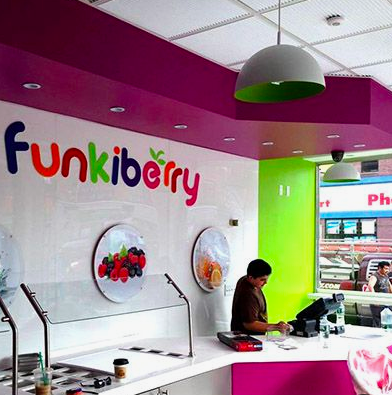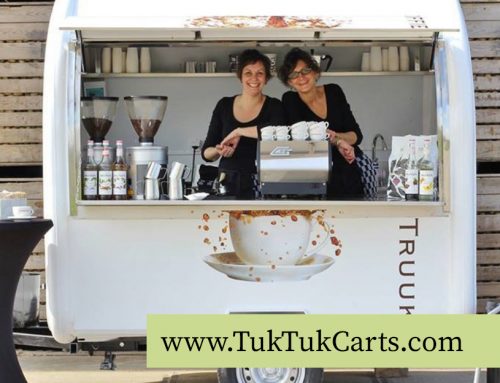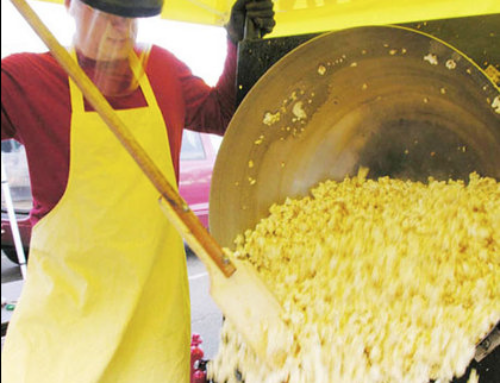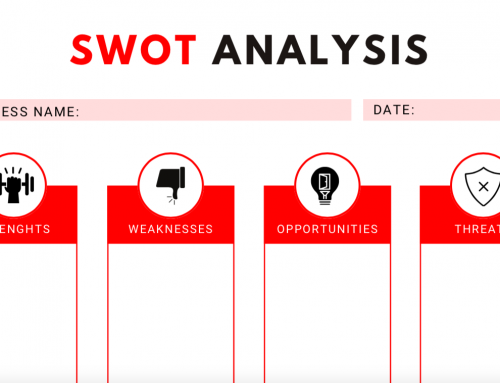Podcast: Play in new window | Download | Embed
Subscribe: RSS
Thinking about starting a frozen yogurt (AKA: froyo) business in the coming year, but aren’t sure if it’s right choice? This is the podcast episode for you.
When you crunch the numbers into a spreadsheet selling frozen yogurt can be a very attractive business model. Low product cost, minimal staffing requirements, and national consumer demand for the product has aided growth. But is this dessert market oversaturated or a fad past its prime?
Today, we outline the pros and cons of the business model, the steps you’ll need to take to differentiate the product and give you a no BS instruction to approach the opportunity thank to today’s guest Evan Waldt of Slices Concession.
Brief History of the Industry
The initial wave of popularity for soft-serve frozen yogurt began back in the 1980s with TCBY. While the dessert never disappeared it didn’t begin a return to popularity until 2006 – 2013 when there was a massive resurgence of interest in the product. Part of this was due to innovative toppings being served with the treat.
Fast forward to today and there have been a lot of closings over the past 5 years. Many of the closings were the result of markets being over saturated or absentee ownership situations that resulted in poorly managed stores. But of the shops that remain open as of 2020, many are doing well financially.

Key Characteristics of Profitable Yogurt Shops
Yogurt shops that stayed in business share similar characteristics according to Waldt. If you’re still in the consideration phase, think about ways you could build the four competitive advantages below into the business.
- Location: The location of any small business is key to operating any successful small business. Look for retail spots near anchor stores such as a Target or restaurants. This will ensure steady foot traffic and discovery of the business.
- Active Ownership / Management: For many of the businesses that closed their doors, it was because the owners of the business weren’t actively involved and slowly let the business die. If you view a yogurt shop as a fully-passive source of revenue this probably not the right choice. You need to get involved and meet customers to improve the odds of success.
- Focus on Quality: To deliver the highest quality product possible, you’ve got to regularly maintain and inspect equipment. This attention to detail will make sure you continue to crank out the lightest and highest quality soft serve.
- Ongoing Innovation: We’ll dive into the specifics of this later in the post, but you’ve got to be tracking trends and testing new flavors to keep things fresh.
- Keep Marketing: Winning shops don’t stop marketing after being in business for 6 months. They keep going. Continue to look for more joint venture opportunities with schools or non-profits. Think about and test new ways to attract people to the store.
At the end of the day soft serve remains a great concept. It’s an affordable treat that families continue to enjoy. But this is not a set it and forget it business. You must be willing to put in the work and able to adapt with the market.

Advantages:
- Dairy Free, vegan, healthy and low-calorie options can be easily added to menus. This allows you to attract a variety of market segments to the business.
- Low product cost. The cost of froyo is under $.10 per ounce on average, but you can often sell the product between $.25 – $.50 per ounce.
- Minimal staff requirements. If you operate a self-serve shop, you only need 1 – 2 employees to operate the business at a time.
- There are many ways to differentiate your product from and remain innovative. If you love experimenting with flavors and trends this can be a fun business from a creativity standpoint.
Challenges:
- In many markets the competition can be cutthroat. Over the past 6 years, many independent shops have gone out of business for this reason.
- The quality and volume of toppings you offer can cut into profitability. If you have a topping bar there can be a significant amount of waste that eats away at profit.
- Although the core product is low other expenses like rent, labor, marketing, and machinery and insurance can reduce profitability to just 15%.
- Maintaining equipment can be a challenge. Ice cream machines are not set it and forget it. They must be cared for to maintain the quality of product.
Frozen Yogurt Shop Startup Costs

Here are some of the typical costs associated with starting a yogurt shop. Many of these are variable costs depending on the location of your business like labor and rent. For states like California you can expect the startup cost to be more expensive than middle America. However, the opportunity in these areas can also be higher.
- Labor Cost: $10 – $15 per hour for counter employees ($200 – $250 for 20 hours part-time). $16 – $21 for managers ($640 – $840 for 40 hours full-time).
- Rent: $1,500 – $6,000 per month.
- Bank Loan / Interest: $1,000 – $3,000 per month
- Product, Mix and Toppings: $1,000 – $2,000 (Highly dependent on sales volume and waste.)
- Cups, Spoons, napkins: $500 – $1,000 per month
- Taxes: The effective small business tax rate is 19.8% on average. This rate will vary depending on factors like location, expenses, and business entity.
- Utilities: $1,000 – $2,000 per month. Expect your electric bills to be significant to keep product cold.
- Electrical Setup: $5,000 – $6,000 Unless you taking over an existing ice cream shop or froyo establishment, you’ll need to hire an electrician to ensure you’ve got sufficient power.
- Permits / Licenses: $1,500 – $3,000 You’ll need to conduct research to see what the startup fees are in your city and state.
- Insurance: $300 – $1000 Depends on level of coverage and location.
- General Construction Cost: $10,000 – $50,000 – Always get different bids for the conversion. Cost will vary widely depending on your vision and size of the unit.
- Ice Cream Machines / Equipment: $10,000 – $50,000. Depends on the number of machines, model, new or used.
All In Startup Cost: At the end of the day you can expect to invest $250,000 – $750,000 to open the doors to a frozen yogurt shop.
Is a Frozen Yogurt Business Profitable?
The profitability of the frozen dessert business remains strong… Mainly because the core product cost is low. Whether you decide to go the self-serve route and charge by weight or simply have a flat rate, you’ll can make a substantial profit.
Keep in mind that all frozen yogurt businesses will have a different profitability based on a variety of factors like location, product quality, management, and brand. With that being said here are a few examples that help demonstrate revenue potential:
- Some chain yogurt shops report and average of $750,000 – $800,000 in annual sales volume of assuming the location has been open 2 years or more (Source). Not this is a gross sales figure that does not factor labor, taxes, and other typical business expenses.
- Menchie’s owners make $94,795 on average per year according to Paysa.com. This is after expenses and provides closer insight to the take home pay of operators.
- According to IBIS World the frozen yogurt is a $1 billion dollar per year industry with 2508 stores in operation. Based on this estimate the average store generate $398,724 in annual sales.
As Evan points out during the interview, although the frozen yogurt is lucrative ongoing maintenance of machines is essential to maintaining high profitability.
If machines are not cared for and properly cleaned, the mix won’t be as efficient and food cost will rise. Simple ongoing care will also reduce the number of times you need to call a repair man.
Mentioned in The Show
Gusto – The best payroll solution for small business. Sign up for Gusto today to get a free 3-month trial.
Southwest Traders Show Product Show – Show put on by the largest frozen dessert supplier in the West. This is an annual show worth attending if you’re in the industry.
Slices Concession – Big thanks to Evan Waldt for sharing his industry knowledge.
The International Frozen Yogurt Association (IFYA) – Source of information and support for individuals considering this business. Also, check out their classified section to find frozen yogurt businesses that are listed for sale.
Frozen Yogurt Shop Ideas
In order to have a successful frozen yogurt shop, you’ll want to offer a unique experience and differentiated product. Here are some specific ideas you can implement in your business that are described in greater detail by Evan Waldt in today’s podcast:
- Ways to Innovate with Frozen Yogurt: There are all sorts of ways to get creative with frozen desserts. Some simple ways are to follow megatrends to see if there are ways you can latch onto them. For example you could start offering Paleo frozen yogurt or perhaps a non-dairy option. This is an easy way to create appeal across market segments. Another creative option could be created around holidays by season like apple cider or pumpkin spice in the fall.
- Self-serve versus Employee Served: By having an employee handcraft the frozen yogurt and toppings, you have more control over the quantity and presentation of the product. The timeless favorite Dairy Queen uses this approach. This creates a totally different experience and leads to more Instragram worthy desserts since your employees will get good at assembling the product.
- Broaden Your Dessert Business: You don’t just need to sell frozen yogurt. You could offer drinks like iced coffees, Boba teas, or scooped ice cream as well. This will set you apart from the self-serve yogurt shops that have sprung up across the country.
Frozen Yogurt Chains VS Independent
These are the top 5 frozen yogurt chains by market share according to Guidant Financial. Evan Waldt suggests that if you’ve seen a lot of mom-and-pop frozen dessert establishments go out of business in your area it can be a good idea to look into a more established franchise with brand recognition. Here are a few of the most popular.
- TCBY
- Menchie’s
- Yogurtland
- sweetFrog
- Red Mango
Other popular froyo chains include the following:
- Cherry Berry
- Orange Leaf
- YogurBerry
- PinkBerry
- Red Mango
Conduct Market Research

Before embarking on any type of business, you’ll want to complete some due diligence. Part of this process is to conduct in-depth market research in your market. This market research data should be included in the business plan for the store.
Google Maps and Search: Go to Google and make a list of the number of dessert shops that are in your area. Don’t just compare frozen yogurt shops, but other things that compete for the dessert or snack dollar. Take into account places like Dairy Queen, boba tea places, and Baskin Robins.
Visit Competitors During Peak Times: Spend time getting to know your competition. Visit these establishments at peak times like Friday night to see how many customers are at the store. Record your findings in the business plan to review later. You’ll also want to take note about the things you like and dislike about each business for later review.
Poll Potential Customers: Ask people in your area whether or not they would visit a dessert shop like the one you plan to open. Questions like this can be asked in person or online in forums or social media groups. People love providing their opinions and you’ll get a good sense if there’s any interest locally.
Popular Frozen Yogurt Menu Flavors
Here are some of the most popular flavors of frozen yogurt on the market. While innovation is key for longterm success in this business, make sure to offer at least a few of timeless flavors as well.
- Blueberry
- Peanut butter
- Strawberry
- Chocolate
- Birthday cake
- Vanilla
- Cotton Candy
- Cheesecake
- Pistachio
- Butter pecan
Popular Yogurt Toppings List
Keep tabs of new topping trends by monitoring social media, food television, competitors, and by attending industry events. Traveling internationally and domestically can also be a smart strategy as trends usually start on the coasts and are gradually discovered in other markets.
- Gummy bears
- Cereal
- Peanuts
- Whip cream
- Chocolate, strawberry and other sauces.
- Mochi
- Chocolate and Brownies
- Crumbled candy bars like Heath, Snicker’s and Crunch
- A variety of fruits like blueberry and strawberry
Questions To Ask Yourself Before Getting into This Business

When you’re determining whether or not any type of business is the right fit, it’s important to be honest with your interests and skills. Here are a handful of questions you can ask yourself as a starting point to determine whether or not this is the right choice for your situation.
- Can I see myself running a frozen yogurt business for the next 10 years?
- Is this the community I really want to serve and get to know (Important when determining a retail location)?
- Does coming up with new flavors and being obsessed with this product excite me?
- Is this something that I could lose interest in within 1 – 2 years?
- Do I enjoy talking to customers and serving people?
The most important step you can take is to be honest with yourself when answering these questions. A frozen yogurts shop is a viable and legit business opportunity that you can make a good living as an owner. But without a passion for the operations of the business, it’s going to be tough sledding to be a success.




